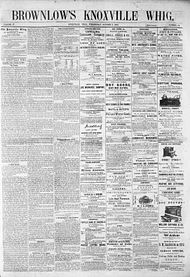Brownlow's Whig
 |
|
| Type | Weekly |
|---|---|
| Format | Broadsheet |
| Founder(s) |
William G. Brownlow Mason R. Lyon |
| Publisher | William G. Brownlow (1840 – 1869); Mason R. Lyon (1839–1840); Valentine Garland (1840 – 1841); C.P. Byers (1845 – 1847); J.W. O'Brien (1849 – 1855); E.B.P. Kinslow (1855 – 1861); T. Haws and Company (1867 – 1869); Joseph A. Mabry (1869 – 1870); Saunders and Clark (1870–1871). |
| Editor | William G. Brownlow (1839-1865); John B. Brownlow (1865-1869); Thomas H. Pearne (1869); C. W. Charlton (1869-1870) |
| Political alignment |
Whig (1839–1854) Know Nothing (1856) Constitutional Union (1860) Radical Republican (1863–1869) Democratic Party (1869) |
| Language | English |
| Ceased publication | 1871 |
| Headquarters |
Elizabethton, Tennessee (1839–1840) Jonesborough, Tennessee (1840–1849) Knoxville, Tennessee (1849–1871) |
| Circulation | 10,000 (appx.) |
| Sister newspapers | Knoxville Journal |
| OCLC number | 60582333 |
The Whig was a polemical American newspaper published and edited by William G. "Parson" Brownlow (1805–1877) in the mid-nineteenth century. As its name implies, the paper's primary purpose was the promotion and defense of Whig Party political figures and ideals. In the years leading up to the Civil War, the Whig became the mouthpiece for East Tennessee's anti-secessionist movement. The Whig was published under several names throughout its existence, namely the Tennessee Whig, the Jonesborough Whig, the Knoxville Whig, and similar variations.
The Whig was one of the most influential newspapers in nineteenth-century Tennessee, due mainly to Brownlow's editorials, which often included vindictive personal attacks and fierce diatribes. A Methodist circuit rider by trade, Brownlow partnered with publisher Mason R. Lyon under a one year contract and launched the Whig on May 4, 1839 to counter rising Democratic sentiment in the region. He quickly made many enemies across the majority Democratic antebellum South. During his career, Brownlow survived several assassination attempts, numerous libel lawsuits, and arrest and imprisonment by Confederate authorities during the American Civil War.
Brownlow's Whig editorials attacked Democrats and Methodism's two main competitors in East Tennessee: Baptists and Presbyterians. Brownlow also attacked groups who he believed supported Democrats, such as Catholics, Mormons, and immigrants. In spite of its anti-secessionist sentiments, the Whig was staunchly pro-slavery in the early days of the Civil War but, upon Brownlow's return from exile in 1863, the paper adopted an abolitionist stance. After Brownlow was elected governor in 1865, his son became publisher of the Whig. In 1870, Whig reporter William Rule (1839–1928) launched the Knoxville Chronicle (later renamed Knoxville Journal), which is often considered the "successor" to the Whig.
...
Wikipedia
